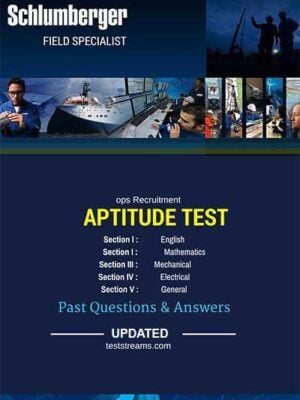Description
PWC Past Questions and Answers
Are you preparing for the Price Waterhouse Coopers (PwC) recruitment test? Boost your readiness for the upcoming PWC test with this collection of PwC Past Questions and Answers. This prep pack is compiled to help you navigate the challenges of PwC’s aptitude tests and excel with confidence. This PWC Past Questions collection includes a wide range of questions and answers, covering various topics and levels of difficulty. Whether you’re preparing for an entry-level exam or a senior management assessment, this pack has you covered.
About PwC (Price Waterhouse Coopers):
PwC (formerly PricewaterhouseCoopers) is one of the largest professional service businesses in the world, helping organisations and individuals with assurance, tax and advisory services. With a presence in over 155 countries and employing over 280,000 people, PwC is a highly sought-after place of employment, with a competitive application process.
PwC Recruitment Process
There are several steps in the PwC recruiting process: application, PwC assessment tests, HR interview, first round interview, and final round interview. Expect to be asked a mix of resume questions, behavioral questions, motivational questions, and case interviews.
PwC assessment tests: You may be asked to take one or more of the following: PwC Situational Judgment Test, PwC Aptitude Test / PwC Psychometric Test, or the PwC Game-Based Assessment
Sample PWC Online Assessment Invite 2025
Dear Candidate,
Further to your application for our client’s (A leading telecommunication company) 2025 Graduate Trainee Programme, we are pleased to inform you that you have been short-listed to take the Graduate Trainee Screening Test. The Aptitude Test will be deployed virtually using PwC’s Virtual Assessments Platform (VAP).
The CBT questions are in a multiple-choice format and will assess your capabilities in the following areas:
1. Verbal Reasoning
2. Numeric Reasoning
3. Logical/ Analytical Reasoning
4. General Knowledge of Current Affairs
Important Notes
To take the Aptitude Test:
1. The examination can be accessed by logging in via https://pwc.proctee.webtest.ng
2. Your USERNAME and PASSWORD are shown above.
3. You will be required to take your picture on the examination platform. The images must be:
· A close-up of your head and shoulders with a full-face view directly facing the camera in a well-lit environment.
· You cannot start your test until you have uploaded your headshot.
General Examination Instructions
1. This is a competitive qualifying aptitude test. You must conduct yourself accordingly. You are advised to have a reliable internet connection before attempting the online aptitude test.
2. Your activities during the period of the aptitude test will be monitored and recorded. You will be required to attempt the test with a webcam and microphone enabled device. (Use of mobile phones for the aptitude test is not supported).
3. You are not allowed to cover your webcams during the period of the aptitude test. Our inability to see you at any time during the test may result in disqualification.
4. During the aptitude test, you are not permitted to leave your seating position. Please adequately prepare before commencing the test.
5. You are not to be assisted during the period of the screening exercise. Nobody is permitted to be around you during the period of the test, not even family members. You may be disqualified if anybody is seen around you during the test.
6. Do not read the questions out during the aptitude test. This may result in disqualification.
7. If you run out of time, the aptitude test will automatically be submitted.
8. Use of earpieces, headphones, facemask, or face caps during the examination is prohibited.
9. Note that you can only commence the examination at the scheduled time.
10. If you violate the rules of the exams, your exam will end automatically.
Why Use PWC Past Questions for the Assessment
The PwC online aptitude test is certainly challenging, but success is achievable if you are willing to put time and effort into preparation. Most importantly, it is important to familiarize oneself with the questions and be able to note the question’s pattern and the difficulty.
What is the PwC Assessment Tests
There are three major types of assessments or tests that PwC uses during their recruiting process: the PWC Online Assessment test/the PwC Aptitude Test, the PwC Situational Judgment Test / PwC Psychometric Test, and the PwC Game-Based Assessment.
PwC Situational Judgment Test
The PwC Situational Judgment test measures a candidate’s competency in several skills needed for the consulting job, including teamwork, conflict resolution, and interpersonal skills.
In the PwC Situational Judgment test, you will be presented with a video scenario that involves some kind of problem or tension. You will be asked how you would tackle each problem by selecting what you think is the best and worst course of action.
This test is given primarily to candidates with work experience. PwC no longer uses this test for undergraduate and graduate recruiting.
PwC Aptitude Test / PwC Psychometric Test
PwC uses a variety of aptitude tests from SHL in their recruitment process to assess candidates that are applying for more experienced roles. These aptitude tests include the PwC numerical reasoning test, PwC verbal reasoning test, and the PwC logical reasoning test.
Numerical reasoning: The PwC numerical reasoning test is a 17-minute test that consists of 12-18 multiple choice questions that evaluate your quantitative skills, specifically your ability to interpret numerical and graphical data.
You will be shown a number of different tables, graphs, and charts and then given at least two questions to answer for each. You are asked to select the best answer
Verbal reasoning: The PwC verbal reasoning test evaluates reading comprehension. You?ll be given a passage of text to read and asked to assess whether the following statements are true or false based purely on the information in the text.
Logical reasoning: The PwC logical reasoning test, also known as the abstract reasoning test or inductive reasoning test, is an 18-minute test consisting of 18 questions that show you a series of shapes and ask you to determine which shape comes next in the sequence.
Why Choose This Prep Pack
- Up-to-Date Content: Based on the latest PwC test formats and requirements.
- Detailed Explanations: Step-by-step solutions to help you understand every question.
- Practice on the Go: Available in Bookshelf format, access your study pack instantly.
PwC Application Process:
PWC Recruitment Process: As one of the Big Four (the others three are – Deloitte, KPMG, Ernst & Young) , PwC is consistently voted one of the world?s best places to work and receives hundreds of thousands of job applications a year. Yet fewer than 30% of those who take the aptitude tests as part of the PwC application process will pass.
The recruitment process can take up to eight weeks (2months) from your online application to the final assessment day.
- Online Application
- Online aptitude test
- Physical verification assessment (Proctored)
- Video Interview
- Virtual Assessment Day
- Partner/Manager Interview
Free Sample PWC Past Questions And Answers
What is the purpose of a financial statement audit
A. To provide assurance on the accuracy of financial statements
B. To prepare financial statements for a company
C. To manage a company’s finances
D. To provide tax advice to a company
Answer: A. To provide assurance on the accuracy of financial statements.
Explanation:
The primary purpose of a financial statement audit is to provide assurance that a company’s financial statements are accurate, reliable, and in compliance with accounting standards. The audit process involves an independent evaluation of a company’s financial records and systems to ensure that the financial statements are free from material misstatement. This provides confidence to investors, creditors, and other stakeholders that the financial information provided by the company is trustworthy and can be used to make informed decisions.
What is the purpose of a risk assessment in the context of an audit engagement?
A. To identify potential misstatements in the financial statements
B. To prepare the company’s financial statements
C. To manage the company’s risks
D. To provide tax advice to the company
Answer: A. To identify potential misstatements in the financial statements.
Explanation:
A risk assessment is a key component of an audit engagement. The purpose of the risk assessment is to identify areas of the company’s financial statements that may be susceptible to material misstatement due to fraud, error, or other factors. This helps the auditors to design appropriate audit procedures to address those risks and provide assurance on the accuracy of the financial statements.
What is the difference between a review engagement and an audit engagement
A. A review engagement provides a lower level of assurance than an audit engagement
B. A review engagement provides a higher level of assurance than an audit engagement
C. A review engagement and an audit engagement are the same thing
D. A review engagement and an audit engagement are not applicable to financial reporting
Answer: A. A review engagement provides a lower level of assurance than an audit engagement.
Explanation:
A review engagement is a type of engagement in which the auditor provides limited assurance on the financial statements, whereas an audit engagement provides a higher level of assurance. During a review engagement, the auditor performs analytical procedures and makes inquiries to assess whether the financial statements are plausible in light of the company’s financial performance. The objective of a review engagement is to provide a moderate level of assurance that the financial statements are free from material misstatement.
What is the purpose of a materiality assessment in the context of an audit engagement
A. To determine the significance of a potential misstatement in the financial statements
B. To determine the appropriate fee to charge for the audit engagement
C. To determine the required financial statement disclosures
D. To determine the company’s overall financial performance
Answer: A. To determine the significance of a potential misstatement in the financial statements.
Explanation:
Materiality is a concept that relates to the significance of a potential misstatement in the financial statements. A material misstatement is one that, either individually or in aggregate, could influence the economic decisions of users of the financial statements. The purpose of a materiality assessment is to determine the threshold at which misstatements in the financial statements would be considered material. This helps the auditor to focus on areas of the financial statements that are most likely to have a significant impact on the financial statements as a whole.
What is the purpose of an internal control system
A. To prevent fraud and errors in the financial reporting process
B. To manage the company’s finances
C. To prepare financial statements for a company
D. To provide tax advice to a company
Answer: A. To prevent fraud and errors in the financial reporting process.
Explanation:
An internal control system is a set of policies and procedures implemented by a company to ensure that its financial reporting process is accurate, reliable, and in compliance with applicable laws and regulations. The primary purpose of an internal control system is to prevent fraud and errors in the financial reporting process. This helps to ensure that the financial statements are accurate and reliable, and that the company is able to provide trustworthy financial information to its stakeholders.














